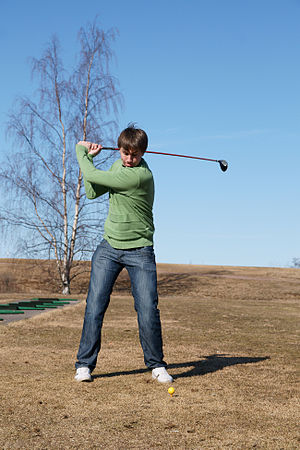By Dr. Dave Edenfield
| English: Golfer in Yyteri Golf Links. (Photo credit: Wikipedia) |
Swinging a golf club involves more than merely concentration and technique. It also strains nearly every joint and muscle in the body. Most adult males, particularly those who are overweight, have difficulty twisting relative to arm movements across the front of the body. As a result, they tend to primarily use their torso to swing the club, which puts tremendous stress on the spine. Even those who have a picture perfect swing often find that their performance on the golf course diminishes the closer they get to the eighteenth hole. The repetitive nature of the game means that the same forces used to propel a golf ball down the course also act to repeatedly stress the spine, shoulder, hips and neck.
| The lumbar region in regards to the rest of the spine. (Photo credit: Wikipedia) |
- It is a good idea to spend some extra time performing quality stretches-before and after your game-to increase your trunk flexibility. While men are traditionally stronger than women, they usually aren't as flexible. Men need to improve their flexibility to maintain a more even and consistent swing plane and thus improve the likelihood of more consistent performance.
- For senior golfers: If you show some signs of arthritis in the hands, consider a larger, more specialized grip for added safety and performance.
- For all golfers: For some, scores may not be as important as enjoying the social benefits of the game. Having clubs that are comfortable will increase the chances of playing for a long time without significant physical limitations.
- Wear orthotics. These custom-made shoe inserts support the arch, absorb shock, and increase coordination. Studies show custom-made, flexible orthotics can improve the entire body's balance, stability and coordination, which translates into a smoother swing and reduced fatigue. While the upper part of a shoe may score style points, what the foot rests on affects your game.
- Avoid metal spikes. They tear up greens and can increase stress on the back. Soft shoes or soft spikes allow for greater motion.
- If you walk the course, pull don't carry your golf bag. Carrying a heavy bag for 18 holes can cause the spine to shrink, leading to disk problems and nerve irritation. If you prefer to ride in a cart, alternate riding and walking every other hole-bouncing around in a cart can also be hard on the spine.
- Keep your entire body involved. Every third hole, take a few practice swings with the opposite hand to keep your muscles balanced and even out stress on the back.
- Drink lots of water. Dehydration causes early fatigue, leading you to compensate by adjusting your swing, thus increasing the risk of injury. Don't smoke or drink alcoholic beverages while golfing, as both cause loss of fluid.
- Take the "drop." One bad swing-striking a root or a rock with your club-can damage a wrist. If unsure whether you can get a clean swing, take the drop.
Other issues also come into play, such as poor posture. Fully 90% of the population suffers from forward head posture, which results from spending hours each and every day hunched over laptops, tablets and smartphones. Golfers afflicted with this are forced to pull back the shoulders and head in order to get into an optimal golf stance. This shifts the body’s center of gravity, which affects the golfer’s ability to hit the ball far and true. It also increases the likelihood of injury, since the muscles, ligaments and tendons all work overtime in an effort to restore balance to the body.
As a result more and more golfers from coast to coast are afflicted with the same ailment that has sidelined a number of golf’s top players: a bulging spinal disc. For many golfers, a bulging disc is a response to the repetitive stress and trauma caused by repeatedly swinging a golf club. When damaged, the discs, which act to cushion the vertebrae, can bulge outward, causing everything from numbness in the extremities to debilitating pain.
Before you become another wounded weekend warrior, there are a number of things you can do to decrease the stress and improve flexibility before teeing off:
If you do detect that you have strained something, don’t be a hero and play on. Head back to the clubhouse instead of the next tee. Golfers rarely consider the cumulative trauma that swinging a club can have on the spine, neck, shoulders and hips until after the fact, by which time the damage is done. Chiropractic care offers a number of treatments and therapies that are designed to mitigate damage, as well as improve flexibility. Everything from massage, heat and laser therapy, electronic muscle stimulation, nutrition and exercise routines are designed to relieve stress and increase muscle flexibility.
While most golfers only seek chiropractic treatment after an injury has occurred, those in the know (including Tiger Woods) realize that chiropractors can as important to improving their golf game as a teaching pro.
Dr. Dave Edenfield and Dr. Steven Warfield are part of the team of doctors and therapists at http://www.lakewoodchiropracticjax.com/ who are dedicated to helping you and your family lead healthier, happier and pain-free lives.




Now I know why I am frequently ready to chuck it in by about the fourteenth hole. I'll have to add chiro to my bag.
ReplyDeleteI know that a number of pro golfers swear by their chiropractors. Now I know why.
ReplyDeleteA few years ago I hurt my back playing too much golf. Thank God for my chiropractor. They were able to get me back on my feet and also playing again in about 3 visits. However I now play less because too much exertion is what cause my problem.
ReplyDelete